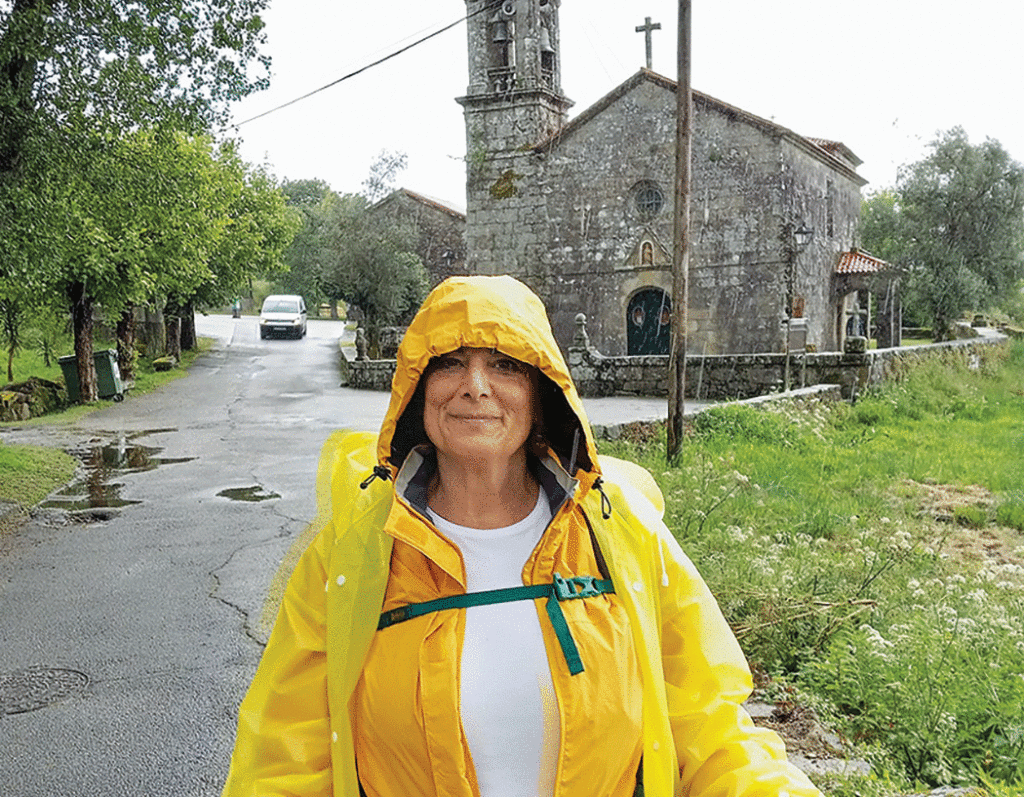
When my friend David invites me to join him on a 174-mile pilgrimage on the Camino de Santiago trail from Portugal to Spain, every ounce of my body, mind, and spirit says, I’m going no matter what!
Perhaps the urge grips me because my 97-year-old mother is in hospice. After her death, I want to be with David on a journey that many have taken to process transitions.
For nearly two thousand years, popes, kings, mystics, nomads, and religious followers have walked the Camino. The journey started as a pilgrimage for people around the world to view the tomb of the apostle Saint James, who died in 44 AD. Over the years, the trail has become a spiritual journey for hundreds of thousands of people who walk it from one of the many starting points in Spain, Portugal, or France. All routes culminate at the cathedral of Santiago de Compostel in Spain.
I start training to be able to walk more than my usual one or two miles. I venture on a five-mile walk in a nearby national park. No problem, until nighttime when my right knee feels intolerable pain. I ask myself, how can I walk the trail?
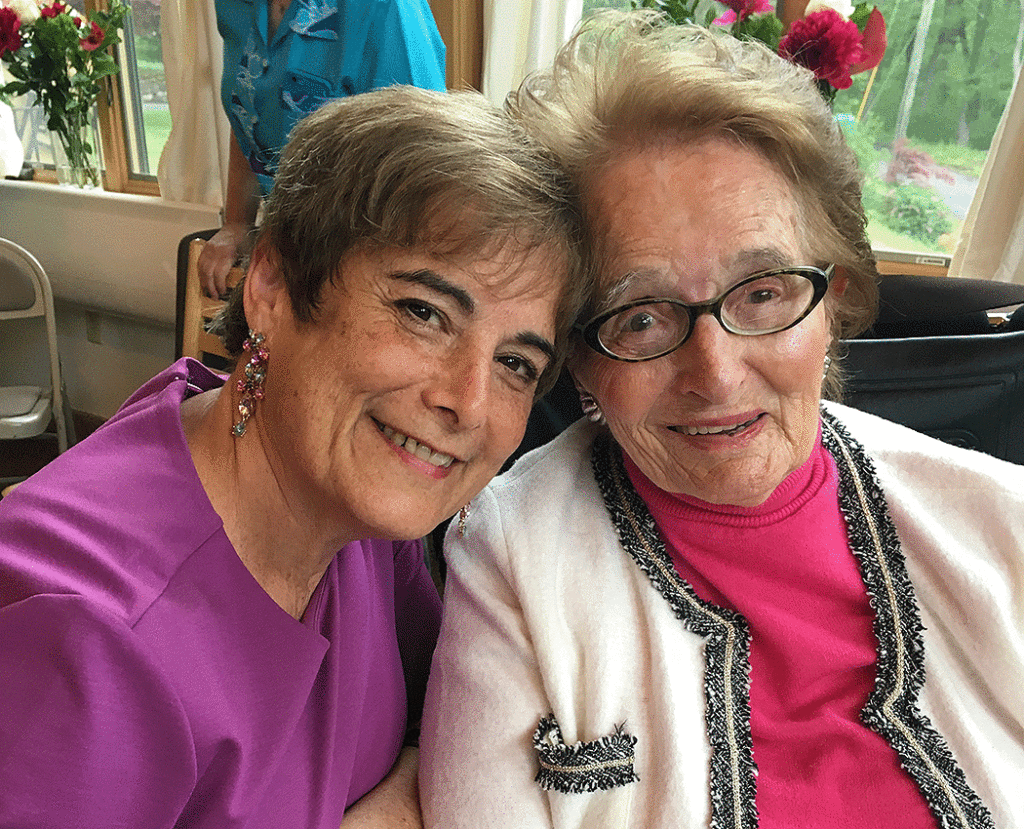
Twice a week I drive to physical therapy, where the therapist shows me exercises for my knee, ankles, and core. She also suggests using a knee brace and walking sticks. The rest of the time I am sitting by my mom’s bedside, holding her hand.
On April 12, I hold Mom’s hand for the last time. I organize her memorial, and pack up my apartment. We fly from Maryland to Porto, Portugal, on April 28.
In Porto, we only have a two-day booking for our accommodation. This is the extent of our itinerary. We begin planning other accommodations, in three-day increments, so that we can have rest and sightseeing days.
While waiting for dinner at our hotel restaurant, I remember how I used to call Mom on every trip. Sometimes every day, and she’d always ask, “When are you coming home?”
Tears fall from my eyes. David touches my arm gently, and says, “It is good to let the grief out.”
In bed, I release the grief that I haven’t felt during all the business of memorial and trip planning. The finality of Mom’s human existence becomes more real, as I miss her supporting me with her wisdom, making me laugh with her wit, and saying, “I love you.”
During one of our first walks in the town of Vila do Conde, I discover that it is Mother’s Day in Portugal. I enter a pastry shop and purchase a miniature carrot cake with a sign saying, “I love you mom.”
I savor each bite and feel the connection of Mom’s heart with mine.
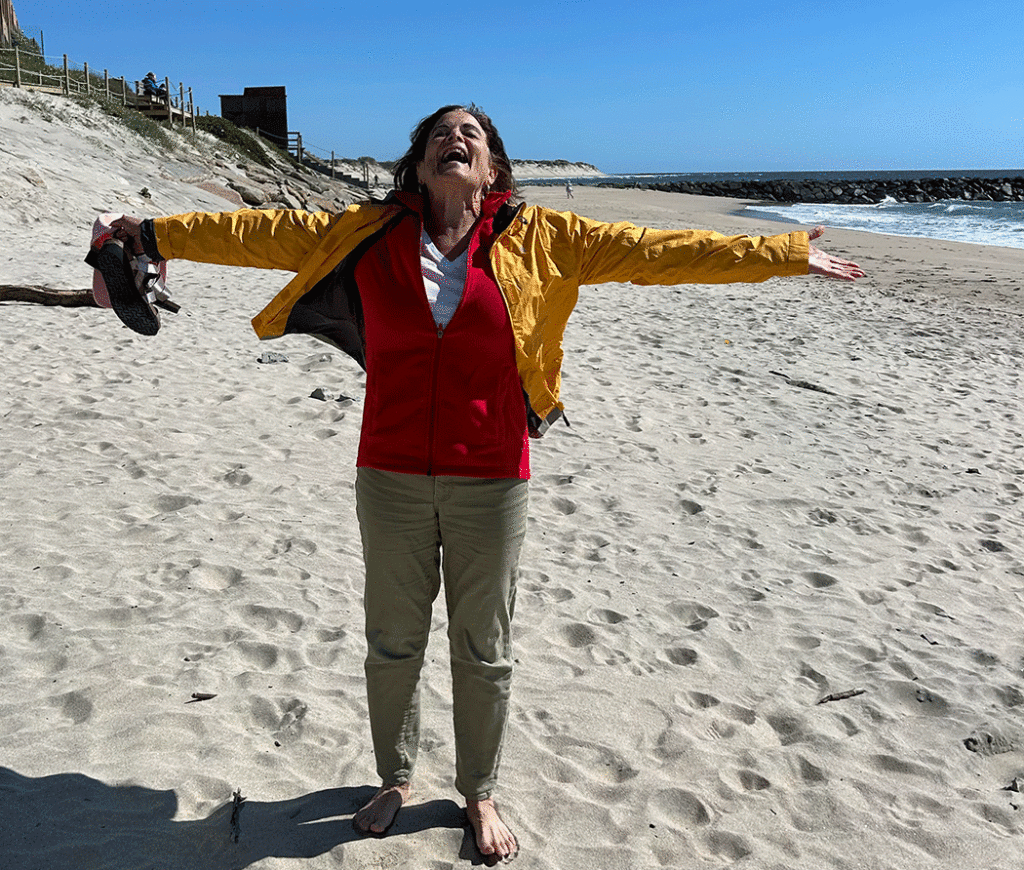
As we continue our walk to Esposende, my heart expands as I witness the ocean waves flowing in and out of the shore. Breathing in the salty air, I feel the sun warming the cool morning temperature. We arrive at our hotel and set foot on the beach, spinning in circles of celebration.
My knee starts to hurt as we arrive at our next stop, Caminha. Frustrated, I tell myself, I want to walk the rest of the Camino—I’m doing it no matter what! I will live on pain killers, popping Aleve.
My frustration diminishes when I realize I have to love my body and give it healing energy. My knee will feel this love, and we will work together to accomplish the end.
We rest for two days. Our apartment has a gorgeous view of the river, where seagulls make their home on the sand during low tide. After this rest, my knee feels better, and we begin the 12-mile trek from from Caminha to Vila Nova de Cerveira.
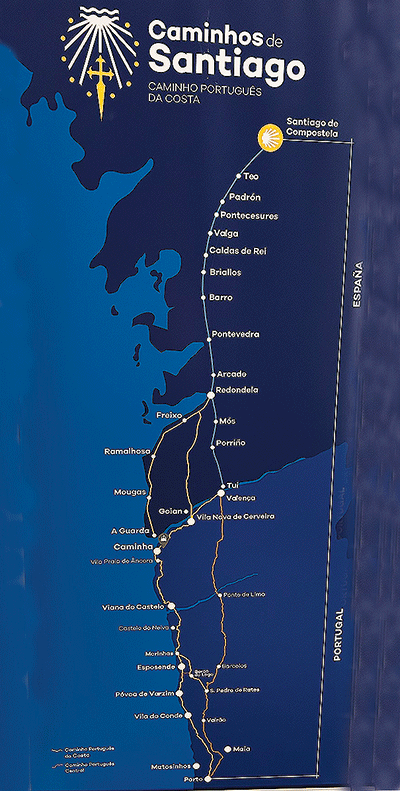 We cross the bridge over the river and follow the water for miles. A young man from England joins us. He is deciding whether to stay living with his girlfriend after their intentional community broke up. A woman from Hungary also joins. She says her husband quit the walk because he ruined his knee by walking too much. I see this as a sign to be patient with my knee. After a while, we all part ways as many pilgrims choose to walk the path in silence.
We cross the bridge over the river and follow the water for miles. A young man from England joins us. He is deciding whether to stay living with his girlfriend after their intentional community broke up. A woman from Hungary also joins. She says her husband quit the walk because he ruined his knee by walking too much. I see this as a sign to be patient with my knee. After a while, we all part ways as many pilgrims choose to walk the path in silence.
Over the next few days, we come to the bridge that separates Portugal from Spain. We cross over into Tui and spend the night. Our accommodation looks like a log cabin. Although we have a wood stove, we don’t understand the directions to use pellets to light the fire. I wake up freezing, and grumpy. David gives me his down jacket to wear.
Before we leave Tui, I notice a blister forming on my pinky toe. Fortunately, I have an extra pair of sneakers with a wider fit that I change into. I also switch from toe socks to regular socks to stop the rubbing. The walking sticks take some of the pressure off the toe, and I am able to walk.
We enter into beautiful forests, and I hear birds singing sweetly. I tell them, “You sound beautiful. Like a symphony.”
In the middle of the forest an outdoor cafe appears, where I buy a piece of pilgrim cake and a lemonade with no sugar—perfectly blended to be sour, yet refreshing. I am grateful there is a clean bathroom.
We continue walking through miles of forests, where we see streams, homes with sheep, goats, and a small horse tied to a post, grazing. Chickens squawk. Roses, yellow buttercups, and purple wildflowers beautify the open field. I think about cement cities, and the destruction of the forests, how we have mistreated the Native Americans who revere Mother Earth.
The walking feels freeing. Joyous. Like moving through God’s country. Almost like floating. One word keeps popping into my head: softness. I feel a softness in my heart growing as we commune with nature.
We leave the forest to walk on paved road. A trail manager tells us to turn left before the industrial area on the way into Porriño. This change of direction leads us into more miles of glowing forests, and streams. We stop to take our shoes off, and I soak my blistering foot in the cool water.
At this point, we have walked almost 13 miles. I am tired, but I tell myself, don’t complain. Just keep going.
It is like that. The edge, the complaining, turns to gratitude, silence, and surrender.
My blister is now flaming red, and I feel a slight ache in my groin muscle. I need to take a break from walking.
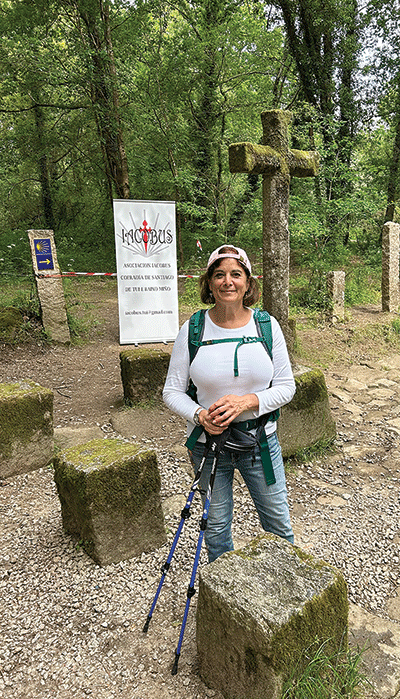 We spend two days resting and sightseeing in Redondelo. A stream meanders through town. We stop to enjoy the fat grey geese with orange beaks swimming and honking at us. Black and white ducks preen their feathers, making us laugh. We do laundry, add minutes to our SIM cards, and buy a filo dough pastry filled with with fruit and whipped cream.
We spend two days resting and sightseeing in Redondelo. A stream meanders through town. We stop to enjoy the fat grey geese with orange beaks swimming and honking at us. Black and white ducks preen their feathers, making us laugh. We do laundry, add minutes to our SIM cards, and buy a filo dough pastry filled with with fruit and whipped cream.
I am proud that I even started this journey with my knee being frail and ankles needing help. I use my mind to overcome these obstacles, believing anything is possible. I fall into deeper love each day, the love that heals my body, that unlocks pain from my heart, and teaches forgiveness; the letting go of ego that can be stubborn,not taking in the wonderful lessons that help me grow. A hard shield of protection is loosening. I have an epiphany: never think of yourself as weak.
I miss my mama. I feel more pain and grief, in knowing that I’ll never talk to her on the physical plane again.
There are no movies, no watching news. Just a natural, simple life.
Rain pours down the day we are leaving Redondelo. It continues to our next stop, Caldas de Reis, where we are finally able to purchase a pair of rain pants. Continuing our trek to Padron, we walk in rain through miles and miles of trees, and mud. I stick my tongue out to taste the delightful raindrops.
The camino carries me like angels blowing me through the woods. The fresh smell of trees, scented like rosemary. Streams are now rivers, due to soaking rain. A pipe comes out of the mountain with a masterful flow.
When we arrive in Padrón, my shoulders are sore from my backpack. I can’t continue the walk to our apartment. We are not sure of the actual location where we are staying. Some locals help us figure out how to get to our place. The woman sees I’m in pain, and sings, “No Woman, No Cry.” I smile.
After Padrón, we walk into the plaza of the Cathedral of Santiago de Compostela, where our journey ends. Hundreds of other pilgrims swarm the plaza celebrating. I feel overwhelmed by unexpected emotions about completing this life-transforming journey. David and I throw our hands up in victory.
As is customary, we attend a mass inside the cathedral dedicated to pilgrims. I am surprised when tears flow. I think about my mom, and how proud she would be of me. I feel a deep connection to her, a oneness, as if her love and spirit are with me.
Flying back to the States, I think about being a nomad and not knowing where I am going to live. But, faith, courage, and openness are now within me.
